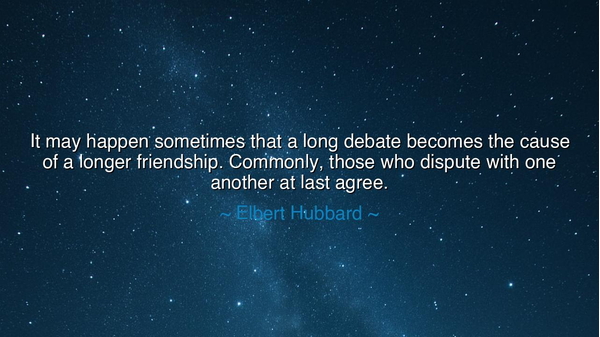
It may happen sometimes that a long debate becomes the cause of a
It may happen sometimes that a long debate becomes the cause of a longer friendship. Commonly, those who dispute with one another at last agree.






“It may happen sometimes that a long debate becomes the cause of a longer friendship. Commonly, those who dispute with one another at last agree.” Thus spoke Elbert Hubbard, the American philosopher and craftsman of thought, whose pen moved with the grace of reason and the fire of conviction. In this saying lies a paradox of the human heart—that from disagreement, from the clash of words and ideas, may spring not enmity, but friendship. Hubbard reminds us that conflict, when waged with sincerity and respect, can be the forge where understanding is born. The very heat of argument, if guided by wisdom, tempers pride into humility and turns opposition into unity.
The origin of this quote lies in Hubbard’s deep belief in conversation as the foundation of civilization. Living in the age of industrial and intellectual upheaval, he saw that men were divided not merely by politics, but by pride and ignorance. Yet he also observed that when two minds meet—not to destroy, but to understand—something sacred occurs. The walls that separate crumble, and the shared pursuit of truth becomes a bridge between souls. For debate, when honest, is not war; it is the searchlight of reason cast upon the shadow of misunderstanding.
In the ancient world, this truth was well known. The philosophers of Greece—Socrates, Plato, and Aristotle—built their wisdom not in solitude, but in conversation. Socrates himself wandered the streets of Athens, questioning all who would listen. His dialogues were not meant to humiliate, but to awaken. He believed that through argument, men could draw nearer to truth and, by extension, nearer to one another. Many who began as his challengers became his admirers. The act of disputing with him, of struggling to see through his questions, became an act of friendship—a shared journey of the intellect and soul.
Consider, too, the bond between Abraham Lincoln and his one-time rival, Stephen Douglas. Their debates across Illinois were fierce and impassioned, two great minds wrestling over the future of the nation. They did not agree in all things, yet through their long discourse, they came to respect one another deeply. Lincoln later spoke of Douglas not as an enemy, but as a fellow patriot—one whose courage and intelligence he admired, even in opposition. When Douglas stood beside Lincoln at his inauguration and held his hat, he symbolized what Hubbard spoke of: that through debate, two men had forged the steel of mutual honor and understanding.
Hubbard’s wisdom reveals a profound moral law: that truth and friendship are not enemies, but companions. To argue well is not to conquer, but to commune—to see through another’s eyes, to challenge and be challenged, to refine one’s beliefs in the fire of dialogue. Only the small-minded fear disagreement; the wise embrace it as the crucible of growth. Those who avoid all conflict often remain strangers to one another, while those who speak honestly, even if sharply, may find that they have discovered a kindred spirit in the very person they opposed.
But for debate to become friendship, it must be rooted in virtue—in honesty, patience, and goodwill. One must argue not to dominate, but to illuminate; not to win, but to understand. When anger replaces reason, words become weapons and hearts close. Yet when humility enters the conversation, when both sides listen as well as speak, then the dispute transforms into communion. For beneath every honest argument lies a shared desire—to know what is true, to live what is right, to be understood.
Let this be the lesson for all who seek wisdom: do not fear debate. Seek out those who challenge your thoughts, for they are the ones who sharpen your mind and strengthen your heart. Disagree with respect; listen with courage; and when you find common ground, build upon it. The longest friendships often begin with a single disagreement, and the truest unity is not found in sameness, but in shared discovery.
For as Elbert Hubbard reminds us, the spark of debate can kindle the flame of understanding, and that flame, once lit, becomes the eternal light of friendship. Let your words, then, not be weapons of pride, but tools of peace. Speak boldly, listen deeply, and rejoice when reason triumphs over division—for in that victory, two souls meet, and what began as argument may end as harmony everlasting.






AAdministratorAdministrator
Welcome, honored guests. Please leave a comment, we will respond soon